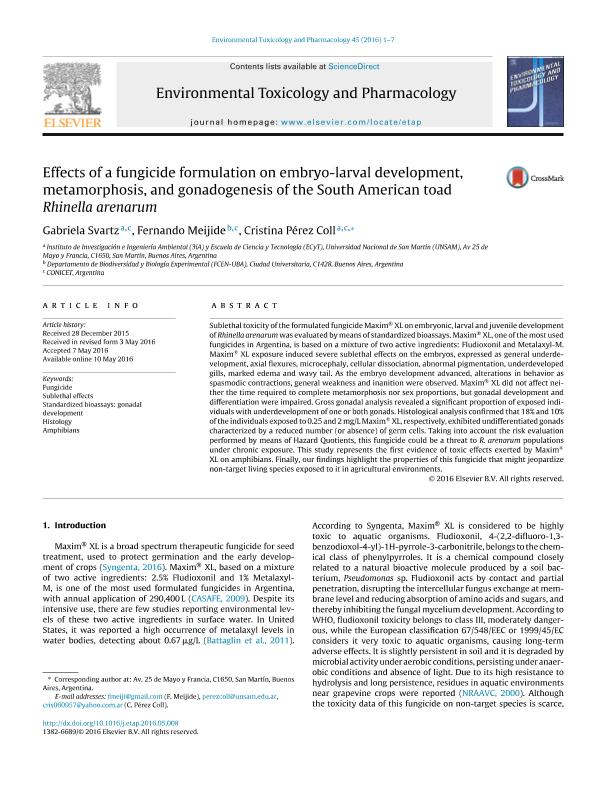Artículo
Effects of a fungicide formulation on embryo-larval development, metamorphosis, and gonadogenesis of the South American toad Rhinella arenarum
Fecha de publicación:
07/2016
Editorial:
Elsevier Science
Revista:
Environmental Toxicology and Pharmacology
ISSN:
1382-6689
Idioma:
Inglés
Tipo de recurso:
Artículo publicado
Clasificación temática:
Resumen
Sublethaltoxicity ofthe formulated fungicide Maxim® XL on embryonic, larval and juvenile development of Rhinella arenarum was evaluated by means of standardized bioassays. Maxim® XL, one ofthe most used fungicides in Argentina, is based on a mixture of two active ingredients: Fludioxonil and Metalaxyl-M. Maxim® XL exposure induced severe sublethal effects on the embryos, expressed as general underdevelopment, axial flexures, microcephaly, cellular dissociation, abnormal pigmentation, underdeveloped gills, marked edema and wavy tail. As the embryo development advanced, alterations in behavior as spasmodic contractions, general weakness and inanition were observed. Maxim® XL did not affect neither the time required to complete metamorphosis nor sex proportions, but gonadal development and differentiation were impaired. Gross gonadal analysis revealed a significant proportion of exposed individuals with underdevelopment of one or both gonads. Histological analysis confirmed that 18% and 10% ofthe individuals exposed to 0.25 and 2 mg/L Maxim® XL, respectively, exhibited undifferentiated gonads characterized by a reduced number (or absence) of germ cells. Taking into account the risk evaluation performed by means of Hazard Quotients, this fungicide could be a threat to R. arenarum populations under chronic exposure. This study represents the first evidence of toxic effects exerted by Maxim® XL on amphibians. Finally, our findings highlight the properties of this fungicide that might jeopardize non-target living species exposed to it in agricultural environments.
Archivos asociados
Licencia
Identificadores
Colecciones
Articulos(IBBEA)
Articulos de INSTITUTO DE BIODIVERSIDAD Y BIOLOGIA EXPERIMENTAL Y APLICADA
Articulos de INSTITUTO DE BIODIVERSIDAD Y BIOLOGIA EXPERIMENTAL Y APLICADA
Citación
Svartz, Gabriela Veronica; Meijide, Fernando Javier; Perez Coll, Cristina Silvia; Effects of a fungicide formulation on embryo-larval development, metamorphosis, and gonadogenesis of the South American toad Rhinella arenarum; Elsevier Science; Environmental Toxicology and Pharmacology; 45; 7-2016; 1-7
Compartir
Altmétricas




